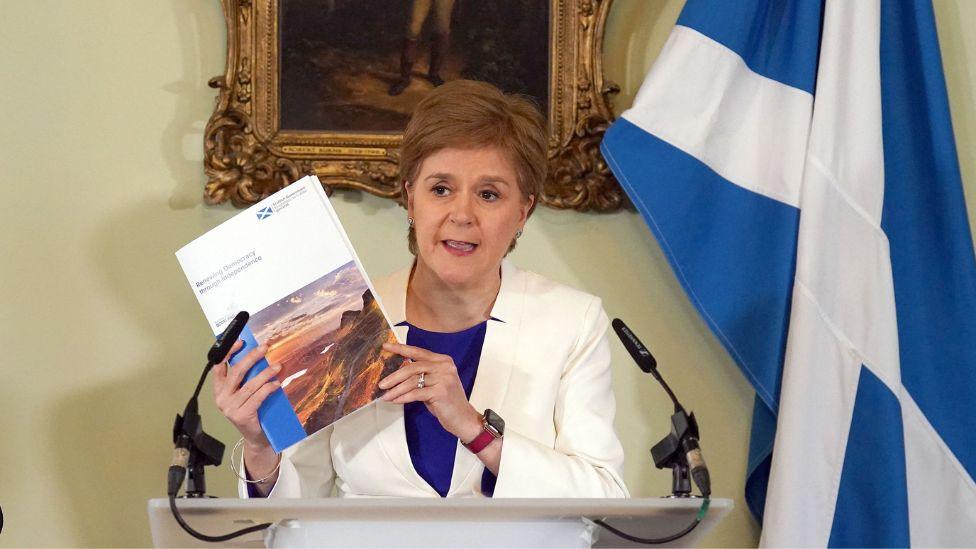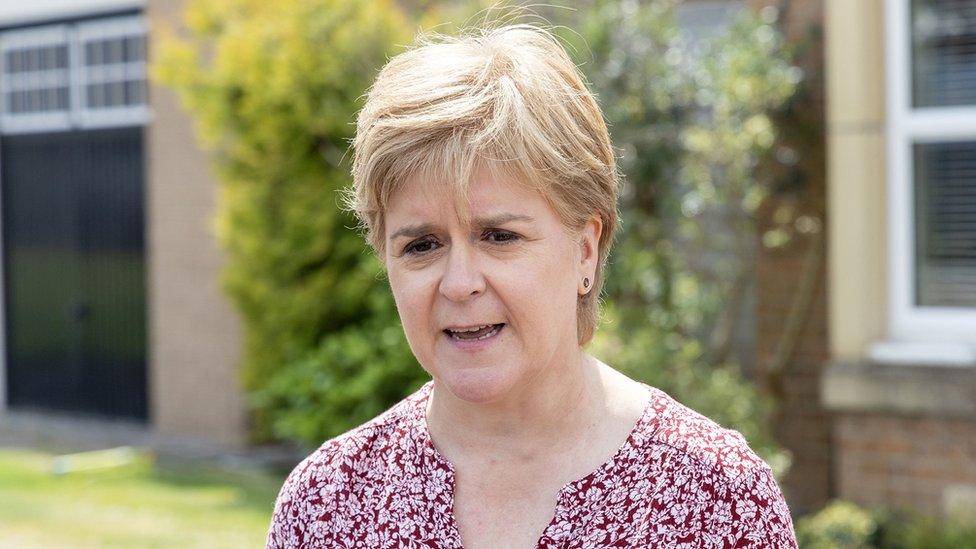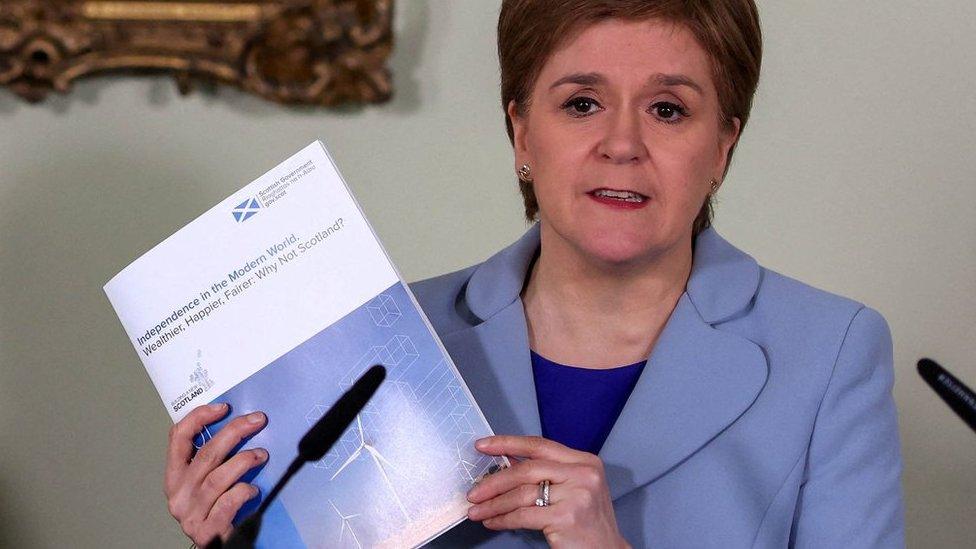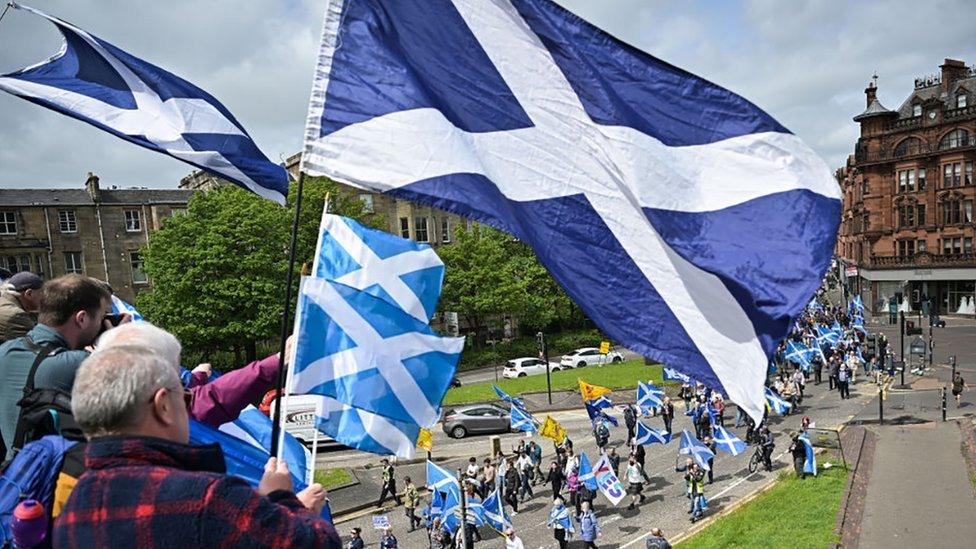Humza Yousaf unveils plan for written constitution for Scotland
- Published
First Minister Humza Yousaf said the proposals would put Scotland "in line with steps taken by other nations across the world"
First Minister Humza Yousaf has unveiled plans to introduce a written constitution if the country becomes independent.
Proposals for the document, which would set out the rights of citizens, are revealed in the latest Building a New Scotland prospectus paper.
The constitution could include recognition of the NHS and strengthen human right protections for Scots.
Opposition MSPs accused the government of focusing on the wrong priorities.
Mr Yousaf said the current arrangements, with no written constitution in place in the UK, mean Westminster could choose to abolish the Scottish Parliament.
At a launch event in Glasgow, he told reporters: "Westminster has already been able to undermine the devolution settlement, override decisions made by an elected Scottish Parliament.
"In future Westminster sovereignty could even allow the UK parliament to repeal devolution through nothing other than a simple majority vote.
"That's not an abstract concept - it is worth remembering the UK government is already seriously considering the repeal of the Human Rights Act, one of the most significant achievements of any UK Parliament in the last 30 years."
The first minister said drafting a constitution would "set a standard below which no government should fall" and create "meaningful rights that put power in the hands of the people who live here".

Former first minister Nicola Sturgeon launched the Building a New Scotland papers in 2022
He said the government favoured a constitution which included recognition of the right to access a system of healthcare free at the point of need, as well as rules on land ownership and environmental provisions.
The document could provide stronger protections for human rights and equality, including upholding and fulfilling the right to an adequate standard of living as defined by the Universal Declaration of Human Rights, the first minister told reporters.
The government also proposed formally banning nuclear weapons being stored on the Clyde and providing a guarantee for workers to take industrial action.
The prospectus paper, named Creating a Modern Constitution for an Independent Scotland, external, is the fourth in the Building a New Scotland series launched by former first minister Nicola Sturgeon last year.
Previous papers have examined how comparable independent countries to Scotland are "wealthier and fairer than the UK", external, how democracy can be "renewed", external with independence and on the economics of an independent Scotland, external.
Mr Yousaf said that the Scottish government's plans seemed "radical" when compared to the UK system - which has a range of laws, conventions, precedents and court judgments in place of a formal constitution.
But he said the proposals would put Scotland "in line with steps taken by other nations across the world" and warned rights in the UK were being "systematically eroded".
"As a country we are now facing a choice of two futures: one driven by Westminster, which is taking advantage of a Brexit Scotland didn't vote for, to erode our rights and undermine our national parliament," the first minister told reporters.
"The alternative is for people in Scotland to take our country's future into our own hands. To embed rights we should all enjoy in a modern constitution."

The SNP are set to discuss a strategy for gaining independence at a special conference
Mr Yousaf set out how the Scottish Parliament would legislate for an interim constitution after a vote to leave the UK - with this coming into force when Scotland becomes independent.
A constitutional convention would then be established to develop a draft constitution, which would be considered by Holyrood.
The first minister said it would only come into force if the people of Scotland backed it in a referendum.
The SNP leader said his party's preferred route to independence was a legally binding referendum - something the UK government has repeatedly refused to countenance.
He said building a consensus among Scottish voters was the way to break the "logjam" over Scotland's future and said he aimed to use the "power of people".
The party's strategy will be discussed at an SNP independence convention on 24 June.
Mr Yousaf told BBC Scotland that his government was focused on the cost of living crisis, the NHS, and growing the economy, but that these issues are "linked" to plans for an independent Scotland.
"We've had over a decade of Westminster-imposed austerity. We have a hard Brexit also being imposed upon Scotland, of course a Brexit we did not vote for, doing untold damage to our economy and to our businesses too," he said.
"So independence gives us the opportunity to take our own future very much into our own hands."
'Out of touch'
A UK Government spokesperson said: "We want to work constructively with the Scottish government to tackle our shared challenges because that is what families and businesses in Scotland expect.
"This is not the time to be talking about distracting constitutional change."
Scottish Conservative constitution spokesperson Donald Cameron said the plan was "full of holes".
"People want the SNP-Green government to be focused on their real priorities right now such as rising bills, fixing our NHS and strengthening our economy," he said.
Scottish Labour constitution spokesperson Neil Bibby said the "SNP resort to pipe-dreams as the country crumbles under their watch".
And Scottish Liberal Democrat leader Alex Cole-Hamilton accused the SNP of being "completely out of touch".
He added: "Deploying more civil servants, money and time into independence is an insult to everyone waiting for help with the cost of living crisis, on lifeline ferries or for critical operations and treatments."
Related topics
- Published14 June 2022

- Published18 June 2023

- Published14 June 2022

- Published17 October 2022
